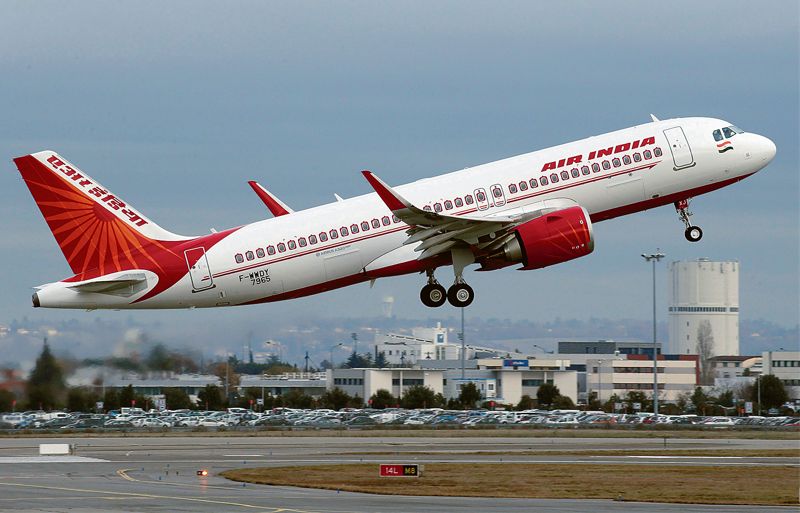
DO-OVER: There is a realisation that market realities must be given primacy rather than clinging to old shibboleths. Reuters
Sushma Ramachandran
Senior Financial Journalist
THE ‘Maharaja’ has finally come home. Air India has been sold back to its original owners, the Tata group, though much the worse for wear after 68 years. The sale has become a hallelujah moment for economic reforms by a government seen till recently as a laggard on disinvestment. Unfavourable comparisons have been made to the Vajpayee era when bold steps were taken to privatise a host of public sector companies. The entire process was put on hold later due to political compulsions by the UPA government but it was expected to be revived by the Modi regime. On the contrary, despite ambitious disinvestment targets set annually in the budgets, achievement has repeatedly fallen short of the goals. Privatisation thus seemed to be a far cry till earlier this year when Finance Minister Nirmala Sitharaman laid down a road map for both privatisation and disinvestment. The banking industry was included for the first time while Air India and BPCL continued to be on top of the list for strategic sales.
By concluding the Air India privatisation within the current fiscal, the government has signalled a determination to move ahead with bold economic reforms.
Even so, given the constant delays and prevarications over the past seven years, it was expected all these big plans would drag on for years. By concluding the Air India privatisation within the current fiscal, the government is signalling a determination to move ahead with big-bang economic reforms.
The critical need for getting government out of the business of business had been underlined as a policy goal by many in the top echelons when the NDA came to power. Yet, little was done to realise it throughout the first tenure of the Modi government. It seems that only now after the pandemic has placed the country’s exchequer in a precarious situation, it is being recognised that bold economic reforms are the only hope for higher growth. And moving to cut ties with the enormous public sector is one such move. The huge losses of public sector enterprises have been a drag on government finances for decades. According to the Economic Survey, as many as 110 of the 366 public sector enterprises are in a defunct state. The consolidated losses are estimated at Rs 44,816 crore. This data is not likely to include the losses of Air India itself which were hived off into a special purpose vehicle to enable the sale of this entity. Total losses at the end of March this year were estimated at Rs 83,916 crore, of which Rs 15,300 crore has been acquired by the Tatas.
What gives credence to the hope that the government is now changing its policy stance on reforms has been a series of decisions announced over the past few months. These include the creation of a bad bank as well as the reversal of the retrospective tax legislation and the concern over revival of telecoms by allowing conversion of debt into equity. It is even approaching the courts to reverse its earlier pleas regarding telecom dues. In other words, there is a realisation that market realities must be given primacy rather than clinging to old shibboleths. One such is the rigid bureaucratic attitude towards revenue collections even if it means destroying livelihoods and creating monopolies. The repeated appeals at international tribunals regarding the Vodafone and Cairn tax cases are evidence of this approach. Earlier also, income tax demands on the Nokia plant in Tamil Nadu led to closure of the plant and loss of livelihood for hundreds. One can only hope that a more holistic approach is taken in future, keeping the larger public good in mind.
As for Air India itself, it is a battered entity now being handed over to the Tatas for revival. Much work will be needed to bring it back into contention as one of the world’s major airlines. After nationalisation, it faced the same handicaps that all public enterprises have had to undergo of working in a fast-paced market but having decisions taken at a glacial pace. It remained for several decades as a niche but well-managed national carrier after being taken over in 1953. But losses began to mount in the 1990s.
It was the disastrous merger of Air India and Indian Airlines that rang the death knell for the two carriers. The question asked then, and which needs to be examined even now, is the reason for such a merger which was opposed by most aviation experts at the time. The two companies had differing work cultures and salary levels. This created tensions at the workplace and smooth operations became a challenge.
Successive governments should have taken a decision much earlier on selling off the airline as it gradually fell into a trough. Had that happened, the situation may not have been as dire as in the past few years. Any thinking on privatisation was stalled by political opposition to selling off a national carrier, considered a crown jewel of the establishment. But determined policymakers could easily have pointed to the success of the privatisation of other national carriers, like British Airways, Air France, Alitalia, KLM and Lufthansa. These airlines were also burdened with losses and bounced back after being sold to the private sector.
What is unique to the sell-off of this iconic airline is the seeming consensus that Air India has gone to the right hands. There is not even a murmur of protest from any political party against the sale. It seems the reputation of the buyer has weighed in its favour. Charges of crony capitalism were levied after the release of the Radia tapes, but the group seems to have recovered from this setback.
The government, however, must not sit on its laurels with this sale. It is time to move ahead and shed the weight of more public sector companies that are being buoyed up by taxpayers’ money. It needs to let both profitable and loss-making public companies be run on commercial lines and thus unlock their productive capacities for the country’s benefit in the long run.
Join Whatsapp Channel of The Tribune for latest updates.




























